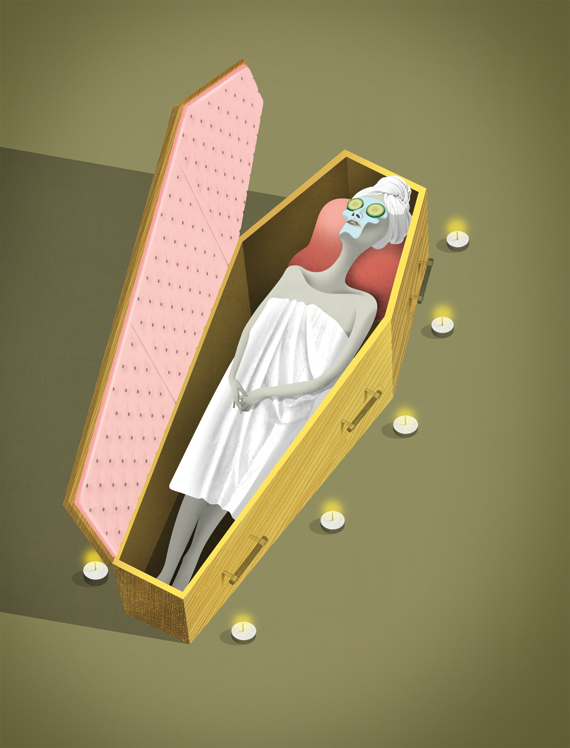You’re going to die, so stop being a whiny baby.
You will be shocked by life. It can’t be helped. The shifting face in the mirror is all you need to know. The gratitude journals, the Pilates classes, that colon cleansing—short-term fixes. Eight glasses of water a day? Won’t last. Shuffle your affirmation deck all you want, but it won’t stop the shivers at three a.m.
Instead, sit in silence and face the wall with total courage. Watch. Listen. Hear the theme? The endless noise of self-abnegation and self-defense? Hear that story you can’t stop telling about what you lack, what you are owed, and what you need? Go ahead and write a love letter to yourself. Be your own best friend. Make an investment in you.
Your skin will still sag. Your hearing will fade. And at long last, your body’s sphincters will relax in one big, embarrassing sigh. All those sleep strategies and relaxation exercises? Sorry— they’re gone. Tiny lacunae in your brain will swallow your childhood phone number, your best friend’s birthday, and what you did last summer. What you did today. Your spine will collapse like a tower of pebbles.
Namaste. You’re dead.
Watch from inside yourself, unable to escape. Listen helplessly to the repeating chorus. Wait for the moment when you can witness yourself—that moment when you see yourself arising and abiding for less than no time at all, then falling away into nothing. The wave lifts from the sea, crests, breaks, and disappears back into the water. Nothing is lost. Wait for that moment. Wonder as your self appears and disappears. See the little girl, long gone, raise her head for a moment and wink. See the young woman fade from sight. See yourself going away.
Now you can stop watching. Unclench your fist. Say yes. Pamper yourself—a massage is always nice. Make sleep a priority. Know that your precious, infinitely beloved, and irreplaceable self will dissolve like a sand castle, grain by grain—and what a relief it is to know. You exist in a great space of knowing, filled with the shared ephemerality of all things. You are like a spring the size of the world that begins to unwind, and you smile because you know it’s going to keep unwinding forever.
Lean back, throw your leg over the side of the chair, look around, and say oh. Say yes. Yes. Everything will be all right. It’s going to be all right. You are already completely well.
EXTRA
7 Habits of Highly Effective Buddhists
Read the canon. In non-oral societies scripture serves as the basis of the Buddhist tradition, yet many lay practitioners have not taken the time to read it, let alone study it. It is direct engagement with scripture and commentaries, in addition to lineage-holders, that animates the tradition.
Put first things first. The 2nd-century Buddhist philosopher Nagarjuna wrote that misapprehending the concept of emptiness is equivalent to grasping a poisonous snake by the wrong end. The same goes for any fundamental doctrine of buddhadharma. Carefully examine a theory and be sure you understand it well before you put it into practice or begin talking to others about it.
Begin with the end in mind. Don’t confuse training with trying: Meditation to develop compassion is not actually being compassionate to others. If you want to weaken your self-centeredness, go on and meditate, but don’t stop there. Take compassionate action.
Be humble. If you’ve navigated the Buddhist scene for some time, chances are you’ve met at least one meditator who showcases meditative equipoise by speaking like he or she has just swallowed a fistful of Quaaludes. But this is just ostentation. Don’t be that person!
Be like a piece of wood. As the 8th-century master Shantideva admonished, if you find yourself filled with pride or anger—or any other intense afflictive emotion, for that matter—“Do not act! Be silent, do not speak! . . . like a log you should remain.” Sometimes inaction is your best course of action.
Speak clearly. There’s plenty of Buddhist-y lingo and rhetoric that can be deployed to stop conversation in its tracks. Resist throwing “nonduality” out there or demonstrating your transcendence of the “thicket of views.” Your friend’s point, in spite of being “just a view,” might be dead-on.
Find like-minded friends. It was through admirable friendship with the Buddha that his disciples found liberation. When Ananda observed that admirable friendship was the “half of the holy life,” the Buddha interrupted, “Don’t say that, Ananda. Don’t say that. Admirable friendship, admirable companionship, admirable camaraderie is actually the whole of the holy life” (Samyutta Nikaya).
–The Eds.
♦
Read the rest of the Special Section on Buddhism and Self-Help, “Let it All Go”
Related: Tricycle Teachings e-book on Dying & Death and Aging
Thank you for subscribing to Tricycle! As a nonprofit, we depend on readers like you to keep Buddhist teachings and practices widely available.
